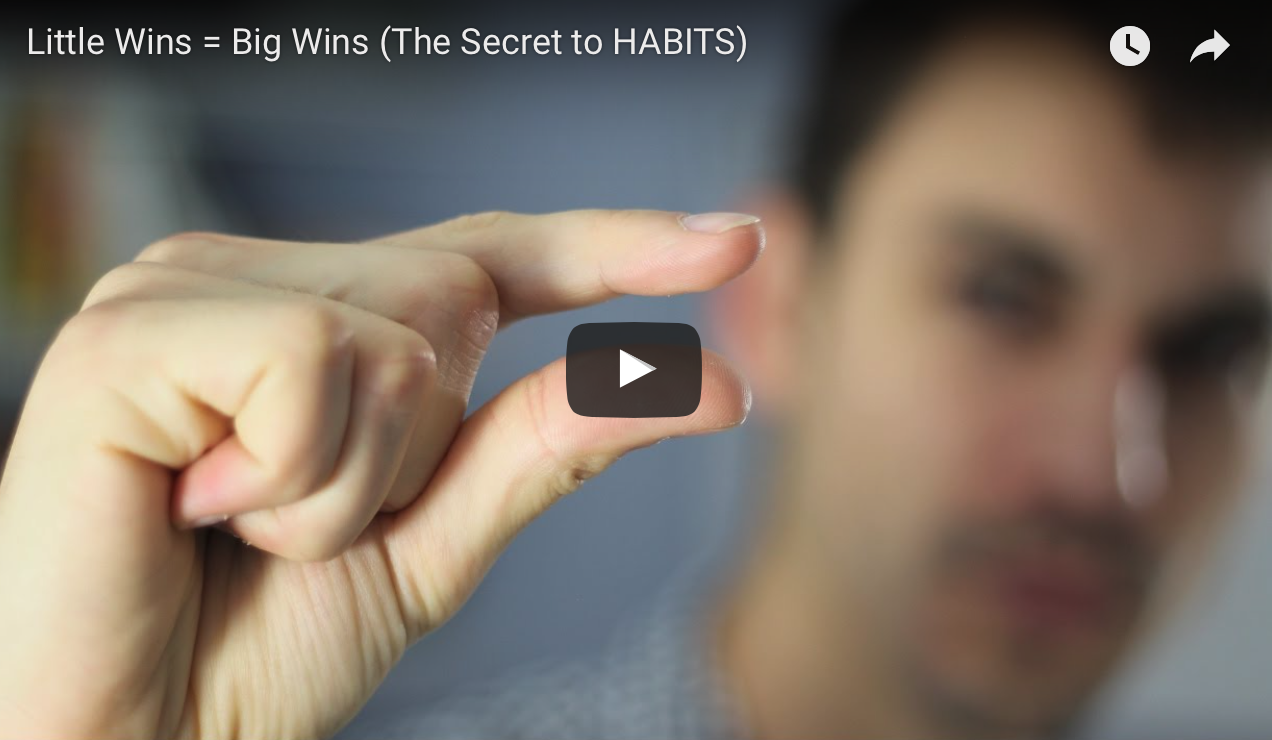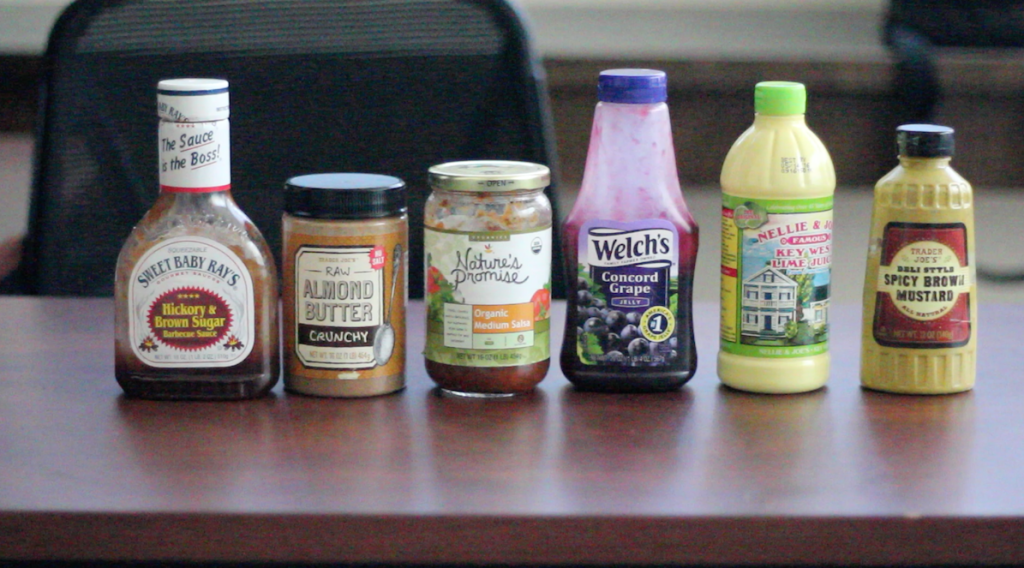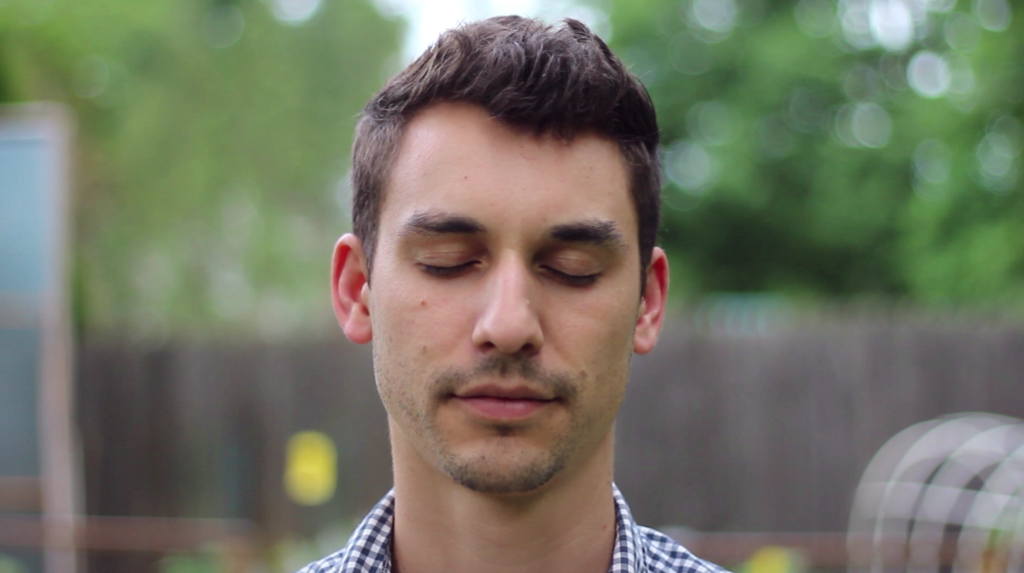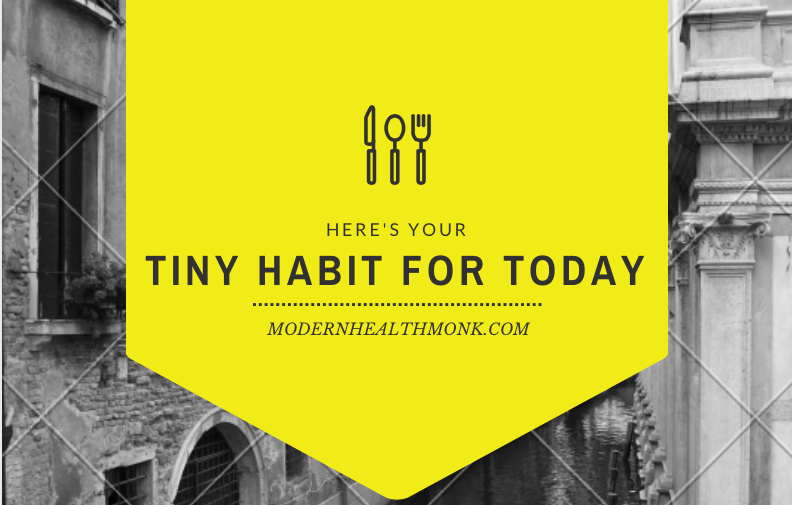
Little Wins, Big Wins (The Secret to Habits)

I bet if you ask your friends how to get fitter, you generally get the exact same advice, right?
Set smart goals that are specific, measurable, actionable… Then you hear other people say that you should set these massive, outrageous, wildly improbable goals.
If they’re not big enough, they’re not motivating you. And if you’re not motivated, then your goals are not big enough.
I found that most of that conventional goal setting advice really doesn’t work very well for me in cultivating certain habits. For me, the solution has actually been the exact opposite—cultivating little wins.
Little Wins vs. Big Wins
Why Little > Big in the Long Run
Wait… my entire life I’ve been told to “dream big” at rah rah motivational seminars by gurus.
What gives?
Why are you telling me to start dreaming – and acting – small?

We’re obsessed with setting huge goals – but what if the small goals actually work better?
You know, for the longest time I’ve been “Mr. Overachiever” – rather than me setting the goal of getting fit in a year, I would set the goal of getting fit in six months.
And I would cross-apply this ambition to every aspect in my life – but the problem was that each time I didn’t achieve that goal, an interesting thing happened:
I started to believe (a little less) that I could really achieve my goals.
In the psychological research, this is usually called “self-efficacy” and is the belief that you are capable of reaching your goals.[1]
That’s when I realized that the way I was approaching goal setting might’ve been completely wrong – if huge goals inspired me for ten minutes, but destroyed my self-confidence and self-esteem later, maybe I should set small goals instead.
The big advantage of setting little goals isn’t because they’re easy- it’s because the essence of achieving goals is self-esteem.
If you’re not self-confident, if you don’t believe you’re going to reach your goal, if you don’t think it’s possible, then you’re not going to try.
The key is to figure out how to be confident every single day in the process of going after the goal, so you’ll know that you are going to get there. You’re going to keep on persisting no matter how many roadblocks or walls pop up.
The little wins philosophy is huge in that, if you do something small, you’re going to feel like you achieved and accomplished something, so you’re going to keep doing it.
And if you feel like you achieved something, you’ll probably keep doing it in a positive state of mine.
What does that look like in action?
The Flossing Habit – How Going Small Was Going Big for Me
O ne of the toughest habits for me to cultivate was flossing. I recently went to the dentist, and I bled like a battlefield victim – despite being someone who eats right, takes care of himself and brushes his teeth.
ne of the toughest habits for me to cultivate was flossing. I recently went to the dentist, and I bled like a battlefield victim – despite being someone who eats right, takes care of himself and brushes his teeth.
So I tried to cultivate the habit of flossing.
The first time I was all gung ho about it – okay, I’m going to town and I’m going to do the entire mouth. I would do it every night, even if it subjectively felt like it took a while – and it started feeling like it was a chore.
Eventually, this 60-second habit was another “ugh” when I just wanted to get to sleep, after a twelve hour work day.
The next day, I just flossed my first four teeth, and an interesting thing happened.
Rather than going to bed, yet again complaining about this stupid new habit that took me three minutes, I felt good.
I got that little dopamine rush that said, “yeah buddy!” I did the habit I planned, and felt good about it.
Then it got me thinking: what if I structured each habit solely based around getting that “yeah buddy!” feeling, rather than how long I was trying to do the habit. Or how many repetitions.
The next night it was easy to do the same thing. I was like, let’s just do two more because it takes three seconds. And eventually, that’s how I turned it into the full-on flossing habit.
How Meditation For 1 Minute > 20 Minutes

I find that the same is true with meditating. In the morning, so many of us have things we want to do. There are many habits we want to try to cultivate first thing in the morning, because we know it’s a certain period where we can work on thing without distractions.
Surprisingly, something as simple as sitting on a damn cushion for ten minutes is pretty hard to do in the morning for most of us when we want to just get going.
Nobody wants to sit around for five, 10, or 30 minutes when they could be getting ready for work, showering or watching TV and eating a bowl of cereal.
So what I did was the same thing – I followed a self-esteem approach to habit-building. I had 30 minutes of meditation on my calendar for two months before I realized that it was not going to work unless I had a pre-existing meditation routine, which I didn’t.
So what were the chances I was really going to actually sit down and meditate? Not that big when I was in a rush.
Rather than setting up the 30 minutes, all I did was meditate a minute a day for the first 10 days. The point was getting my butt on the cushion, rather than doing the 30 minutes of meditation.
I focused more on that “yeah buddy” self-confidence (building that feeling of self-efficacy), and excitement, rather than doing the core benchmark (30 minutes a day). The ultimate paradox was that I ended up getting to that 30 minute a day benchmark pretty quickly – because each day when I sat on the cushion, my body and mind remembered how enjoyable it was from the day before.
And that was all because I made it easy.
Don’t Build Habits – Build Confidence

This is goal achievement from a confidence perspective. Not the perspective of raw achievement in 30 days.
One final example for you here is cooking. So many of us know we should cook because it’s generally healthier and more cost effective.
But doing it has all kinds of mental stuff coming up. It takes time. I don’t know how to cook. It don’t have a recipe book with less than 45 ingredients in each meal.
So rather than trying to cook a full meal, just cook an egg. Literally, crack one egg in the pan and cook that one egg, and then you are done. You are the cook for the day – and you made your masterpiece.
Again, the point is confidence and building the habit. Once you do the habit once and it’s easy, you’re pretty confident that you can do it again, and you will do it again. If you enjoyed it, you will most likely do it again in the future too.
If you’ve set some huge goal and you don’t like doing it (like working out for two hours), you’re not going to do it.
Building on these tiny wins, you can easily end up working your way up to massive habits, whether it’s fitness, losing weight, cooking, writing a book, or saving money to travel.
Remember – it’s not about executing on your massive goal in the next 30 days. It’s about building the self-confidence and enjoyment that comes from that “yeah buddy!” feeling of doing a habit that’s a piece of cake.
Your “Master the Day” Habit for Today

Today, what if you tried just going smaller – rather than going bigger?
What if you tried working on that one habit at a level that left you feeling like it was easy and enjoyable?
What if the path to conquering the world with your goals is actually to start with something so tiny that no one can even see it?
-Alex
Images: Woman running, guy flossing
